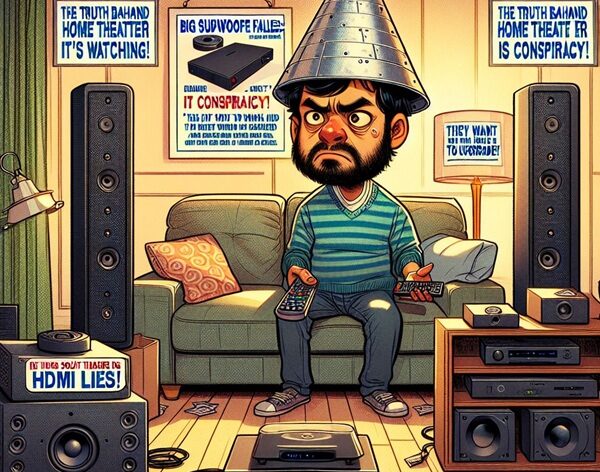The Truth Behind Home Theater Failures: It’s Not a Conspiracy
Home theaters are investments. Well, maybe not investments, those are supposed to make you money. Let’s start again, home theaters are a commitment, and they can cost a lot of money for us to have the “perfect” setup. But what happens when reality falls short of expectations? It’s easy to feel disappointed, and sometimes, we might even think there’s a conspiracy against us. In The Truth Behind Home Theater Failures: It’s Not a Conspiracy, we explore why we often resort to conspiracy theories when faced with home theater disappointments—and why it’s rarely the case.
Fantasy: The Allure of Conspiracy Theories
Conspiracy theories are easy to fall into. Heck, just do a search on the interwebs and I am sure you will find them attached to anything you want. Tinfoil hat stocks are on the rise these days. But let’s look at some of the common ones.
We Think Everything is About Us
When something goes wrong with our home theater setup, it’s tempting to believe that someone is out to get us. After all, we’re important to ourselves, so why wouldn’t others be plotting against us? This mindset can make us feel special, but it’s often far from the truth.

You are NOT that special, despite what your mom tells you. If you made a bad purchase or something breaks, that’s life. It’s why we can return things and warranties exist. Let me also temper your expectations with this. We are home theater enthusiasts. We are not the majority, or even the minority. We are the exception. So when AV gear doesn’t meet our standards, most people won’t notice or care.
Blaming Others is Easier
It’s more pleasant to blame an external “other” than to accept that we might have made a mistake or that the product simply didn’t meet our expectations. This shift of blame helps us avoid the uncomfortable reality of self-reflection.
Here is a harsh reality: The internet LIES! I know that surprises you, but you can’t trust everything you read. Why? There are lots of reasons. Some folks have brand bias. Review units are often provided by the brands, so reviewers feel the need to be more generous in their praise. Plus, there is the hive mind on forums that spouts the same drivel, no matter the facts you present them.

As I said, if you made a mistake, returns can be easy. It’s often your ego that takes a hit, but most folks you know in real life won’t care or notice. So your pride will only be hurt by faceless folks on the internet. I assure you, you will survive!
Misunderstanding Statistics
There are instances where products fail, and sometimes, it feels like it’s happening to us repeatedly. This can lead us to believe that there’s a pattern or conspiracy at play. However, our misunderstanding of statistics often leads us to see correlations where none exist. Remember, correlation does not equal causation.

Take Onkyo, for example. In the mid-2010s, there was an issue with Onkyo’s HDMI boards failing. The cause was later determined to be a faulty batch of chips and control boards. Despite the fact that only a small percentage of the impacted AV receivers or products made it to shelves, it was what Onkyo became known for. Even today, when I look up Onkyo, I see posts regarding their HDMI issues and how they are not a quality brand.
Every product line has units that fail. Even if 10% of Onkyo’s AV receivers failed, that means that 90% didn’t. Our brain is wired to amplify the negative. Of course, social media doesn’t help. It can be one big echo chamber that continues to reinforce your assertions.
Reality: The Real Reasons Behind Disappointments
Reality tends to be simple, whereas conspiracy theories are webs that we need to get to the heart of. As a reviewer, I tend to see past the BS, and look for the truth. And you can as well.
There’s a Reason for Everything
While it’s comforting to think there’s a grand scheme against us, the reality is usually more mundane. Products can fail for various reasons, but rarely is it because a cabal of people is out to get you. Manufacturing defects, shipping damages, or even user error are common culprits.

In most cases, Occam’s razor, or the simplest answer tends to be the right one, applies. If we are faced with a situation where our subwoofer is not producing sound is it more likely that a) the subwoofer broke, or b) the subwoofer was unplugged? The conspiracy is that big subwoofer wants to sell us new gear. The reality is that it got unplugged by mistake (or that a setting was changed or a cord unplugged, etc.).
Can’t Know What You Don’t Know
It’s not always a conspiracy. Sometimes, we don’t have all the information about why something went wrong. There could be a myriad of reasons behind a product’s failure that we’re simply unaware of. It’s important to acknowledge that not knowing doesn’t imply malicious intent.
It’s easy to think that a company is out to get us. That they want their products to fail so we will have to buy more and more. That leads me to my last point…

What’s The End Game?
Consider what a company would gain from deliberately sabotaging your home theater experience. A bad review? A customer who will never return? It doesn’t make sense for businesses to act maliciously. More often than not, things go wrong because of unforeseen circumstances, not because of evil intentions.
Do you really think that in today’s age of social media and viral videos that they would knowingly field a product that is likely to fail AND not support it? Many companies, like SVS, are renowned for standing by their products, even after warranties have ended. That’s how you build brand loyalty and word of mouth advertising.

Plus, let’s not forget about litigation. If a company puts out a product or service that they know is likely to fail, or they purposely design to fail…that’s going to be a massive lawsuit.
Our Take
The truth behind home theater failures: it’s not a conspiracy. It’s easy to fall into the trap of thinking a company is out to get you when your gear doesn’t perform as expected. But more often than not, the issue is something simple—like a loose cable, a misunderstood spec, or a rare manufacturing defect.
Reality is messy. Products fail, expectations get misaligned, and sometimes, we just make mistakes. But that doesn’t mean there’s a shadowy cabal of AV engineers plotting your disappointment.
So next time your subwoofer doesn’t rumble or your receiver shuts off mid-explosion, take a breath. It’s rarely a plot. Check your connections, revisit the manual, use trusted guides like those from AVGadgets, and troubleshoot methodically. And remember: The Truth Behind Home Theater Failures: It’s Not a Conspiracy, you’re just navigating a complex hobby, not a grand scheme.


